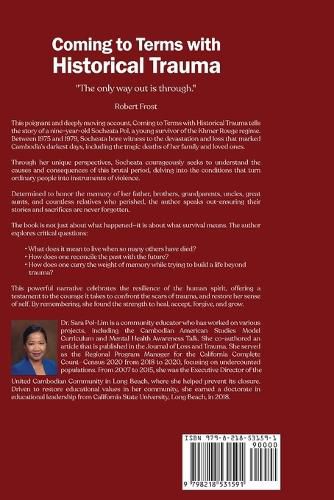Readings Newsletter
Become a Readings Member to make your shopping experience even easier.
Sign in or sign up for free!
You’re not far away from qualifying for FREE standard shipping within Australia
You’ve qualified for FREE standard shipping within Australia
The cart is loading…






Coming to Terms with Historical Trauma recounts the harrowing experiences of Sara Pol-Lim during the Khmer Rouge regime in Cambodia from 1975 to 1979. It explores themes of loss, survival, and the long-lasting impact of trauma on individuals and communities.
Sara reflects on her childhood in Phnom Penh, where she lived with her parents and four brothers. The family was characterized by love, kindness, and a strong sense of community. Her maternal grandmother, Mak Yay, instilled in her the values of compassion and respect for all living beings. However, the idyllic life was shattered when the Khmer Rouge seized power on April 17, 1975, leading to widespread violence and oppression. Sara recalls the sudden transformation of her society, where fear replaced kindness and compassion, and her family was torn apart as they faced unimaginable horrors.
The Khmer Rouge regime enforced brutal policies that targeted educated individuals, city dwellers, and ethnic minorities. Sara's family suffered immensely, losing her father, three brothers, and many extended family members to the violence. She describes the trauma of witnessing the deaths of her brothers and the emotional burden of survival.
This book raises critical psychological questions: How does a survivor make sense of the past when so many others did not survive? What does it mean to carry the memories of those who died? Can one truly heal, or does trauma remain a permanent part of identity?
$9.00 standard shipping within Australia
FREE standard shipping within Australia for orders over $100.00
Express & International shipping calculated at checkout
Coming to Terms with Historical Trauma recounts the harrowing experiences of Sara Pol-Lim during the Khmer Rouge regime in Cambodia from 1975 to 1979. It explores themes of loss, survival, and the long-lasting impact of trauma on individuals and communities.
Sara reflects on her childhood in Phnom Penh, where she lived with her parents and four brothers. The family was characterized by love, kindness, and a strong sense of community. Her maternal grandmother, Mak Yay, instilled in her the values of compassion and respect for all living beings. However, the idyllic life was shattered when the Khmer Rouge seized power on April 17, 1975, leading to widespread violence and oppression. Sara recalls the sudden transformation of her society, where fear replaced kindness and compassion, and her family was torn apart as they faced unimaginable horrors.
The Khmer Rouge regime enforced brutal policies that targeted educated individuals, city dwellers, and ethnic minorities. Sara's family suffered immensely, losing her father, three brothers, and many extended family members to the violence. She describes the trauma of witnessing the deaths of her brothers and the emotional burden of survival.
This book raises critical psychological questions: How does a survivor make sense of the past when so many others did not survive? What does it mean to carry the memories of those who died? Can one truly heal, or does trauma remain a permanent part of identity?